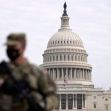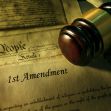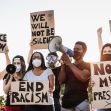In May, President Trump threatened to deploy the U.S. military in response to protests roiling the country. However, it's not clear that he has the power to do so. American law prohibits the use of the military on domestic soil except in very specific circumstances. To order troops into a U.S. state, the President likely needs the approval of the affected state's governor.
This exception was carved out by 1807's Insurrection Act, which states that "whenever there is an insurrection in any state against its government, the President may, upon the request of its legislature or its governor," use armed forces to uphold the law. If the governor requests aid, sending military troops in response is constitutional.
The issue becomes murkier when the President wants to use military force in a state that has not requested aid. The governors of Illinois and California have strongly indicated that they will not welcome federal troops in their states. Oregon, however, wasn't given a choice. The legislature was forced to push encroaching troops out of the state after repeated violent clashes between protesters and armed soldiers.
The federal agents were not invited by Oregon's governor. Instead, the Trump administration relied on a proviso of the Insurrection Act that gives the President the right to defend federal property and enforce federal laws. In 1957, President Eisenhower used the proviso to justify sending troops to safeguard Arkansas' public school integration efforts.
Legal scholars agree that the federal government can protect its property. But how much leeway does it have? If federal agents are protecting a Portland courthouse, do they have the right to patrol the city?
"If the federal troops are starting to wander the streets, they appear to be crossing the line into general policing, which is outside their powers," Washington College of Law at American University professor Robert Tsai told the New York Times.
Department of Homeland Security officials claim that they're justified in venturing far from federal property because they need to "conduct investigations." This claim is being challenged in court. David Lapan, a former homeland security spokesperson, questioned if using tear gas or batons on protestors was appropriate. "That's not an investigation... That's just a show of force."
When questioned over sending federal troops into states experiencing civil unrest, acting Homeland Security Secretary Chad Wolf blamed local authorities, telling reporters: "Enforcing federal law is not by invitation... We continued to ask local and state police to help and get involved. ... If violence is directed (at the federal courthouse), they would not engage, they would not make arrests."
Protesters who damage federal property are subject to federal law. Once the crime is
committed, some argue, federal agents have the right to apprehend the perpetrators no matter where they've fled.
There's no easy solution to these problems. Illinois, a state that has been vocal about its opposition to federal intervention, recently imposed fresh restrictions in Chicago after multiple nights of violent protests and looting. The move comes less than two months after President Trump threatened to send troops to the city. At the time, Mayor Lori Lightfoot said: "Under no circumstances will I allow Donald Trump's troops to come to Chicago and terrorize our residents." However, if the situation continues to deteriorate, Trump may fulfill his threat.
"Criminals took to the streets with confidence there would be no consequences for their actions," Chicago Police Superintendent David Brown said after a particularly violent protest. "I for one, refuse to allow these cowardly acts to hold our city hostage."
Mayor Lightfoot added: "We are already at work finding you and intend to hold you accountable for your actions. I do not care whatever justification was given for this. There is no justification for criminal behavior ever. You have no right."
States are responsible for policing their citizens. Federal military response is only appropriate when the state specifically asks for it or when the situation is so dire that the federal government needs to step in to defend its laws, property, or citizens.






